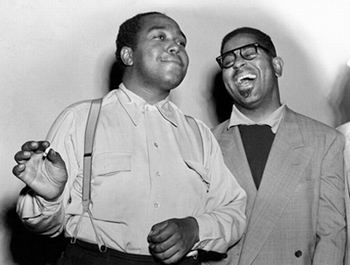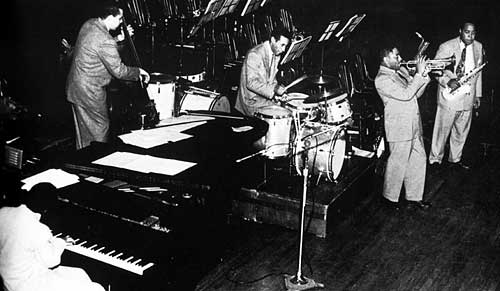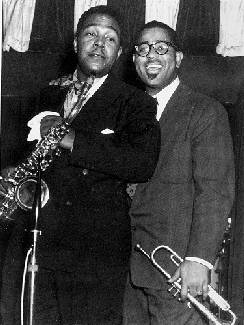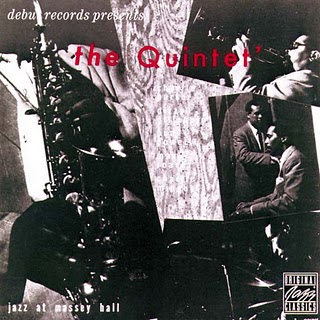THE QUINTET / “The Quintet Mixtape”

History is always changing. When events are unfolding we take one view, years later, accessing in retrospect we take a different view—perhaps we have more information, or we see what has lasted and what has fallen away, or even who has responded in the long term and who has abandoned what was formerly thought of as significant. History is slippery, especially music history.
What was loud at one time is but a faint whisper now, or what seemed to be just another note in the chorus now seems to be a clarion call heralding change and new directions. In jazz, bebop was a major revolution, recognized as such from the beginning and recognized today as one the most significant periods.
Bebop was a music of the forties, the war years. By the fifties other winds were blowing with the cool movement and then came the 1959 avant garde movement heralded by a bevy of seminal recordings that year including Kind Of Blue by Miles Davis, Giant Steps by John Coltrane, The Shape Of Jazz To Come by Ornette Coleman, just to quickly name a few but there were others such as Dave Brubeck, Charlie Mingus and so forth. Of course, all in the new movement owned a debt to bebop and most of the musicians readily acknowledged that debt.
What is interesting to me is that in the case of bebop there is a major document that was recorded not at the beginning of the movement but during the waning years. On May 15, 1953 in Toronto, Canada (hardly a stronghold or hotbed of bebop) what is sometimes billed as the greatest jazz concert was held featuring a quintet composed of the major players of the day.
Charlie “Bird” Parker on alto, Dizzy Gillespie on trumpet, Bud Powell on piano, Max Roach on drums, and Charlie Mingus on bass. Mingus was primarily a West Coast bred musician who was not directly associated with the beginnings of bebop, but the other four are widely considered “the” leading players on their respective instruments. Moreover, Parker and Gillespie are regarded as the godfathers of bebop.
A trivia note is that the successors to Bird and Diz had cut their teeth playing with Bird and Diz. Miles Davis came to jazz adulthood playing with Bird, and John Coltrane matured playing tenor with Dizzy. What an ironic development that the two major post-fifties jazz musicians both played with their bebop predecessors/counterparts, and just as both Bird and Diz played together before going their separate ways, Miles and Trane did the same thing. In one sense, this recording is not only a summation of the past but also a hint of what the future would bring. How often in the arts is there such an orderly succession of geniuses?
At the time of the recording, who could have known that a historic document would be produced? Mingus may have had some premonition because recording the session happened mainly because of Mingus’ diligence. He was the organizing force that pulled the musicians together, which was no easy task, especially because at that point Bird and Diz had not played together in years. Mingus somehow persuaded one and all to participate in the concert. Mingus had also founded Debut Records and was intent on musician-led documentation.
There is very little debate about the importance of this album. Subtitled Jazz At Massey Hall, this is considered the one jazz record that every bebop aficionado had to own if one was serious about the music.
Part of the back story is that this was the last time that Bird and Diz recorded together. As a dynamic duo, they had established the foundation of bebop. Both set stylistic standards as solo instrumentalists. Both were also composers, and Diz was both prolific and masterful. 
Bird is the legendary, iconoclastic figure, a preacher who mesmerized everyone who heard him. Dizzy was consummate entertainer in addition to his prowess as a soloist and composer so his influence extends far beyond hardcore jazz circles. Plus, Diz also was responsible to invigorating Afro-Cuban rhythms into mainstream jazz.
On this recording you can hear both Bird and Diz playing full out and offering a summation of their status as founding fathers. Bird is particularly strong with a blues-intonation coloring the fleet-fingered harmonics for which Bird was famous.
Bud Powell spins off strong solos. In fact, Powell, Mingus and Roach did a trio set that night that is available. Mingus is reliable (Although Mingus overdubbed his bass parts, if you cop the Complete Jazz at Massey Hall you’ll get all the music including the trio tracks and none of the Mingus overdubs.) To me, the most surprising contribution is the fierceness of Max Roach drumming furiously albeit adeptly at ultra-fast tempos. This is some of the best bebop drumming on record.
Significantly the band is simply called The Quintet as if to say this is “the” best jazz quintet of all time. And within the context of bebop, it just might be the best recording of a live performance.
—Kalamu ya Salaam
The Quintet Jazz At Massy Hall
01 “Salt Peanuts”
02 “All The Things You Are/52nd Street theme”
03 “A Night In Tunisia”
This entry was posted on Monday, January 31st, 2011 at 3:55 am and is filed under Classic. You can follow any responses to this entry through the RSS 2.0 feed. You can leave a response, or trackback from your own site.
2 Responses to “THE QUINTET / “The Quintet Mixtape””
January 31st, 2011 at 9:53 am
Again, great stuff. My Mondays would be incomplete without BOL
February 5th, 2011 at 8:27 am
what a moment! i can hear and feel how the passion of Charlie Parker, Dizzy Gillepsie, Max Roach and Bud Powell brought into being a new approach/style. thank you, kalamu.
Leave a Reply
| top |